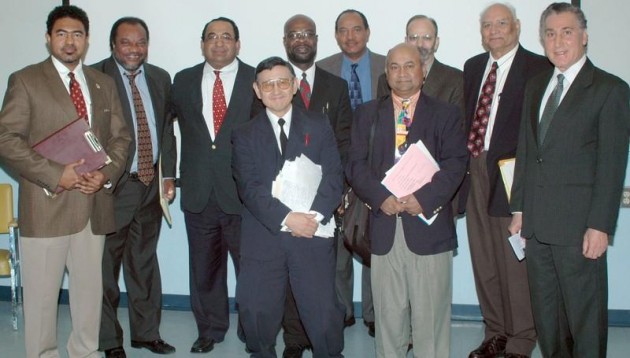
This year’s World Affairs Symposium, sponsored by the Department of Political Science and Public of Administration at Grambling State University featured guests from the Department of Political Science at Jackson State and Southern University as well as professors here at GSU. Discussions focused on studies of cultural, economic and social development in least-developed countries.
Panel discussions in each area were held. Panel members were each allotted seven minutes and presented papers on the fallacies of underdeveloped countries borrowing monies from world financial institutions such as: The World Bank, World Trade Organization and the International Monetary Fund, how understanding the cultural differences of others can save much conflict and how more powerful nations often resort to military actions to resolve conflict.
"Look at the culture of others before getting in their business," said Dr. Emmanuel Nwagsboro, a professor of political science at Jackson State. Dr. Nwagsboro’s presentation on culture, leadership and change focused on how developed, powerful nations use their political savvy to bully Third World nations. He presented in his paper the importance of understanding a country’s political and social culture. One should get to know a people and their way of doing things before criticizing or using money/politics to manipulate a given society, he said. The major problem for Third World nations seems to be financial, according to presentations by Drs. Jim Y. Kim and Abdalla Hagan of GSU and Dr. Leon Newt of Jackson State.
Dr. Hagan presented a paper on "The Myth of Foreign Loans and Fallacies," which discussed the proper ways for Third World countries to spend resources and get out of debt. Considering the deficit for the United States where there is much wealth, a country that can barely afford to feed the masses of its citizens is less likely to be able to repay exorbitant interest rates for loans in the hundreds of millions of dollars, Dr. Hagan said. The paper also attributed part of the heavy deficits to corruption, in that monies are not always used for the purposes in which they were initially given.
Several presentations dealt with how underdeveloped countries desire membership with financial entities like the World Trade Organization because these organizations promote trade between many nations. However, while Third World nations welcome free trade, developed nations tend to shy away from trade with these countries, thus cutting into their main source capital – commerce, said Dr. Newt.
Symposium presenters offered many solutions for this problem and the problem of cultural intolerance.
Many professors researched the problems in different parts of the world and wrote presentations based on their findings. In all, the papers were "eye-opening presentations on various parts of the world," said Dr. Martin Edu of the GSU Department of Mass Communication.
Overall, the presentations were simply-worded yet detailed explanations of the problems surrounding underdeveloped nations, why these problems exist, and what developed countries are doing to help.
